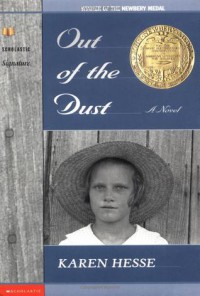

A terrible accident has transformed Billie Jo's life, scarring her inside and out. Her mother is gone. Her father can't talk about it. And the one thing that might make her feel better -- playing the piano -- is impossible with her wounded hands. To make matters worse, dust storms are devastating the family farm and all the farms nearby. While others flee from the dust bowl, Billie Jo is left to find peace in the bleak landscape of Oklahoma -- and in the surprising landscape of her own heart.
~ from back cover
In this verse novel set in the Oklahoma Panhandle during the Dust Bowl years, we meet Billie Jo Kelby. Billie's parents had always hoped for a boy, but her mother, Pol, struggled to get pregnant again after Billie's birth.
Daddy named me Billie Jo.
He wanted a boy.
Instead, he got a long-legged girl
with a wide mouth
and cheekbones like bicycle handles.
He got a red-headed, freckle-faced, narrow-hipped girl
with a fondness for apples
and a hunger for playing fierce piano.
Billie Jo's father, Bayard, is a World War 1 veteran turned wheat farmer, but the last few years the crop has been a lean one, to say the least. This year has been especially poor. Pol offers a number of solutions -- everything from digging a well to trying a different type of crop --- but Bayard stubbornly wants to stick to what he knows.
The winter of 1934 Billie is thirteen and her mother is pregnant once again. Billie's well aware how tight money is, so she can't help but worry about how her parents will find the means to care for the baby. When Billie is offered a job playing piano at the Palace Theater, she mainly wants it because she just loves playing so much, but the promise of even a few extra coins in the house is certainly a nice bonus!
Then comes the day of the fateful accident. The day Bayard decides to set a full bucket of kerosene next to the stove. Pol, mistaking it for water, pours it in a container over the stove when she goes to make coffee one morning. You can guess what happens next. Yep, a wall of flame. Pol catches on fire, Billie tries to put out the flames. The flames are extinguished, Pol survives. At least that day. She is sent into early labor, which ends up taking not only her life but the baby's as well.
Billie's hands are destroyed from trying to put out the flames on her mother. She's heartbroken at the loss of her mother and she assumes she'll never play piano again. All at once, virtually everything that brought Billie any little bit of joy has been snatched away from her in an instant. To make matters worse, the night before Pol died, Bayard ended up bailing on her in her time of need. While she cries for water, he takes the little bit of household money Pol had saved up and takes off to go get drunk. At this point in the story, it's hard not to see Bayard as a pretty trash husband.
After her mother's death, Billie and her father pretty much stop speaking with each other, beyond the essential phrases. Though at first Billie had figured her piano playing days were behind her, she eventually convinces herself to start practicing again, working through the pain and stiffness, retraining her fingers to feel the keys the way they used to. Over time, Billie and her father learn to communicate again, acknowledging that despite this horrific loss, they're still a family and still very much need each other.
I have a hunger,
for more than food.
I have a hunger
bigger than Joyce City.
I want tongues to tie, and
eyes to shine at me
like they do at Mad Dog Craddock.
Course they never will,
not with my hands all scarred up,
looking like the earth itself,
all parched and cracking,
but if I played right enough,
maybe they would see past my hands.
Maybe they could feel at ease with me again,
and maybe then,
I could feel at ease with myself.
First reading the accident scene, it seemed natural to be angry with the father at his carelessness. This completely avoidable moment irrevocably forever altered all these lives! To my surprise, Hesse in her afterword writes that that scene was not from her imagination but instead pulled from actual news reports she came across in a 1934 edition of the Boise City newspaper!
Not only does this little verse novel effectively bring forth the historical elements of the Dust Bowl years for the intended middle grade audience (and beyond) but also incorporates the powerful lesson that running away from disappointments or hardships won't necessarily make them go away. Sometimes you have to stay put and tackle the unpleasant environment to get to the other side. But once on that other side, you might find that everything you were longing for actually already exists right where you are, if you just shift to a different perspective.










